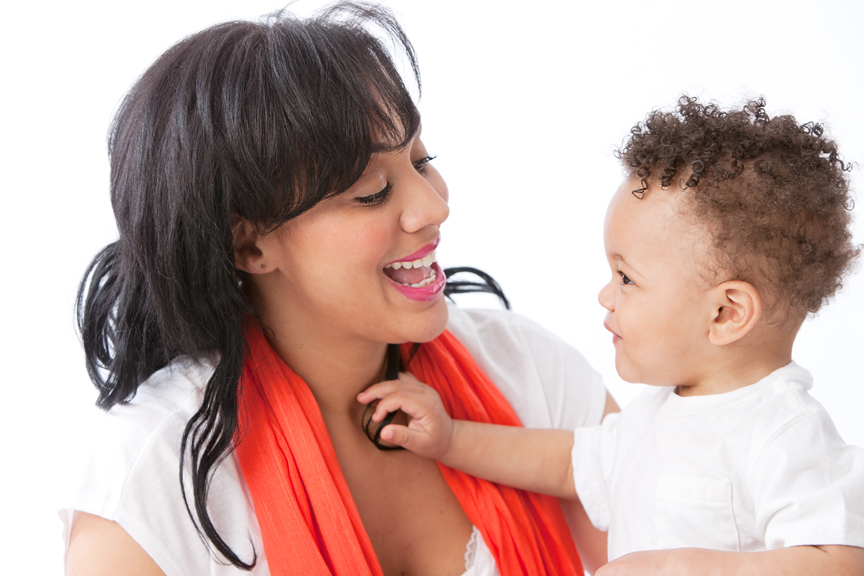- Behavior
- Health
- Parenting
BLOG: Talking to your baby is crucial for early development

Question: Does my baby understand when I speak to her? I’m not sure if she can understand what I am saying. Is it important for me to talk to my baby?
Answer: It is a common misconception that babies cannot understand language. Quite the contrary, children begin to understand language before they speak their first words. Pay attention to your baby’s body when you speak. Ever notice her looking at your face or lips when you talk? When she cries or seems uncomfortable, does she begin to calm down just by hearing your voice? Does she smile, coo, make noises and move her arms and legs in response when you speak and play with her?
Babies look to their parents and other caregivers for comfort and guidance. Your voice helps your baby understand her environment and creates a sense of safety and security, which helps her bond to you and form a healthy relationship. Did you know that babies can tell the difference between their primary caregivers and another person’s voice? Babies also prefer their primary caregivers to others.
Involve your baby in daily tasks
It is important to read, talk and sing to your baby often, as this forms their language development and ability to communicate and learn. Find opportunities in your daily routine to make a habit of communicating with your baby. You may want to teach your baby her body parts (head, hands, arms, toes, legs, stomach) during bath time and/or while applying baby lotion. You may also want to show your baby objects around the house or while out at the store and label them so she begins to understand what things are.
You also can teach your baby words by reading or pointing to and labeling pictures in books. It would be helpful to include your baby in your daily tasks and chores by talking to her about what you’re doing. Around nine months, your baby will engage in shared focus with you on an object, which is called joint referencing. In other words, you may label an object “ball” and your baby looks at the ball, back at you and back at the ball again, indicating she is jointly paying attention to the same object as you.
Early communication sets foundation
Acknowledging your baby’s feelings and talking about them will help her understand and regulate her emotions in the future. For example, when your baby is smiling at you, you may want to say something like, “You’re so happy, I can see you smiling,” and make sure to reciprocate the feeling by smiling back. When your baby is sad, you can say something such as, “You are crying. You are so sad. Let’s figure out what you need.”
While your baby may not have the language skills to tell you what she needs or wants, her body will remember the feeling later. She will know that when she jumps up and down when excited or cries when sad, she can go to you when needed because your early communication set the foundation to confide in you. When reading her favorite book from childhood or singing her favorite song when she is older, she will remember the happiness and comfort she felt as a baby. Talking to your baby and engaging her teaches her that she is loved, important, cared for, understood and heard.
So, yes, babies do benefit greatly from their caregivers communicating with them from the very beginning. In fact, it’s a crucial factor in helping your baby develop to her full potential and form healthy relationships.
Hilary Jacques is director of the Child and Family Center in West Palm Beach for Center of Child Counseling.
You May Also Like
-
- Education
- Health
- Parenting
Hey! Why can't my child do that yet? (and should I worry?)
Children develop at their own pace. But it's natural to wonder whether your child is progressing at a typical rate versus possibly developing a learning disability. Free screenings …
Read More -
- Health
- Parenting
- Safety
Safe sleeping arrangements can save your baby's life
Did you know the risk of infant death is 40 times higher when your baby sleeps with you? Find helpful safe sleep tips here to prevent a tragedy. …
Read More
Related resources
-
- Behavior
- Education
- Health
211 Palm Beach Treasure Coast
Help Me Grow – information, guidance and developmental assessment of children up to age 8
2-1-1 Website Email -
- Behavior
- Parenting
Community Partners
Positive Parenting Program, known as Triple P — free seminars and one-on-one guidance to help families improve their parent-child relationships
561-841-3500 Website Email -
- Behavior
- Parenting
Center for Family Services of Palm Beach County
Positive Parenting Program, known as Triple P, offers free seminars and one-on-one guidance to help families improve the parent-child relationship
561-616-1222 Website Email -
- Education
- Parenting
- Things to do
BRIDGES of Palm Beach County
Ten neighborhood hubs help parents raise children healthy, safe and strong
561-740-7017 Website
